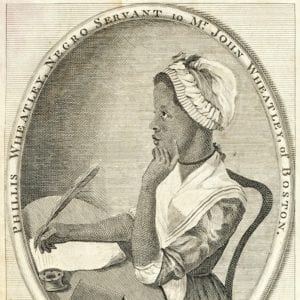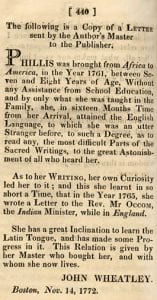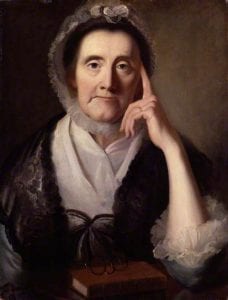Phillis Wheatley and The Power of Place
By Sara Abston
 Phillis Wheatley was an influential writer during the period of the Great Awakening. However, her status, as an enslaved, African woman living in colonial Boston, made her writings atypical of other authors during that period. Although the specific years involved in the Great Awakening are debated, the 18th century period typically ranges from the 1720s through the 1740s. As discussed throughout his book, Thomas Kidd describes the Great Awakening as the period of spiritual revivals affecting colonial America and Europe in political, religious, and social aspects. Influential leaders during the Great Awakening promoted spirituality and religion on a personal level rather than abiding by religious expectations due to the legality. It is important to note that these leaders were predominately white males.In comparison to colonial Caucasian individuals, the enslaved population in colonial North America was viewed as a subordinate group of individuals. Phillis Wheatley was a female, African slave and renowned author in Boston in the 18th century.
Phillis Wheatley was an influential writer during the period of the Great Awakening. However, her status, as an enslaved, African woman living in colonial Boston, made her writings atypical of other authors during that period. Although the specific years involved in the Great Awakening are debated, the 18th century period typically ranges from the 1720s through the 1740s. As discussed throughout his book, Thomas Kidd describes the Great Awakening as the period of spiritual revivals affecting colonial America and Europe in political, religious, and social aspects. Influential leaders during the Great Awakening promoted spirituality and religion on a personal level rather than abiding by religious expectations due to the legality. It is important to note that these leaders were predominately white males.In comparison to colonial Caucasian individuals, the enslaved population in colonial North America was viewed as a subordinate group of individuals. Phillis Wheatley was a female, African slave and renowned author in Boston in the 18th century.
Modern online databases use 21st-century technology to sort information from libraries and collections located around the world and distribute easily accessible information to a larger audience interested in the subject matter. Using information, sourced from online databases, about the publishing frequency, location, and content of Phillis Wheatley’s writings aids in analyzing Wheatley’s impact and role during the Great Awakening. This background information gives insight to the significance of the writings of Phillis Wheatley and prompts me and fellow readers alike to ask questions of her content, analysis of letters, and the magnitude of her word’s impact throughout the world. When learning of the facets of Phillis Wheatley, it is imperative to ask questions. Was the content of Wheatley’s writings abbreviated due to her societal status? Did Phillis Wheatley gain the respect and proper distribution her works deserved as advanced literature in the 18th-century? Did prominent leaders of the 18th-century respect and engage Wheatley to discuss developed ideas? To what lengths across the world did Wheatley’s works spread to continue her impact and influence? These relevant questions allow a reader to satisfy their knowledge and gain a better, well-rounded perspective of Phillis Wheatley.

Phillis Wheatley was born in Africa, but at an early age she was sold into slavery and transported to colonial North America. Phillis became the slave of John Wheatley of Boston. Yet, John Wheatley and his family noticed Phillis’s bright aptitude and promoted Phillis’s education and assisted in publishing her poems and writings. This relationship was atypical for a slave and her colonial master; with her owner’s support, Phillis continued to write and share her perspective. Phillis Wheatley was the first African-American female author to be published in North America.
Some of Phillis Wheatley’s most famous pieces were written before she turned twenty years old, such as “Poems on Various Subjects, Religious and Moral.” Wheatley employed elusive techniques to discuss her slavery within her writings. Phillis Wheatley’s writings covered spirituality, moral issues, current events, and alluded to slavery. Although sometimes indirect because of her techniques, the insight from the perspective of an enslaved African female in North American is noteworthy. Phillis used sophisticated writings styles in her poems and works. The writings often discussed issues within Colonial America and shared her voyage from Africa to North America. These letters also give insight into her correspondence with historical figures, as well as depict her character and attitudes as an enslaved black female with abolitionist ideals during the 18th century. Phillis Wheatley often used advanced language to avoid directly speaking of slavery while still alluding to the attitudes of the enslaved population.
As her writing techniques broadened, John Wheatley and his wife continued to promote the publishing in local newspaper advertisements, but ultimately inquired of the opportunities for Phillis to publish a book with the backing of her growing popularity. With many colonial publishers refusing to publish an African enslaved female’s writings, the Wheatley family decided to inquire about publishing in London. Upon her visit to London, Wheatley met with the Countess of Huntingdon, which was recorded in newspapers throughout North America, such as The Pennsylvania Chronicle. The opportunities and experiences of Phillis Wheatley were completely out of the ordinary for African slaves in North America. Phillis was provided the opportunity to academically develop, mature in writing, publish books and poems, and maintain relationships with influential individuals of the 18th century.

(c) National Portrait Gallery, London; Supplied by The Public Catalogue Foundation
During her lifetime, Phillis’s writings made an impact not only in colonial America, but also specifically in London as well as impacting various influential leaders of the time, such as Samson Occom and Benjamin Franklin. Wheatley’s poems and writings were published in London, and later in North America. This gave Wheatley another opportunity to associate with influential leaders from various locations across the world, specifically in Europe. This global impact is significant because it provides a historical perspective of and from women during the Great Awakening, the enslaved population and African slave-trade, and spiritual and moral analysis.
The author’s relationships and perceptive demeanor both played key roles in shaping an African-American slave into a well-known published author in North America and beyond. Wheatley was atypical of slaves across North America which is evident enough by the infrequency and lack of additional preserved writings of other enslaved individuals and women during the Great Awakening.
Wheatley’s writings had a global impact. During a time when published authors were typically white, male leaders, writings from an African American female slave were unprecedented. The publishing and sharing of Wheatley’s writings are significant for many reasons. First, because her use of spirituality with allusions to depict the lives of slaves is an unparalleled way to describe slavery during the Great Awakening. Second, her communication with leaders such as Samson Occom and the Countess of Huntingdon depict the sheer impact and power of her abolitionist outlook to an unsuspecting world.
References
“Africans in America, Part 2, Phillis Wheatley.” PBS, Public Broadcasting Service, www.pbs.org/wgbh/aia/part2/2p12.html.
Kidd, T. S. (2007). The Great Awakening: The Roots of Evangelical Christianity in colonial America. New Haven, CT: Yale University Press.
“Phillis Wheatley Biography.Com.” Biography.com, A&E Networks Television, 24 July 2017, www.biography.com/people/phillis-wheatley-9528784.
